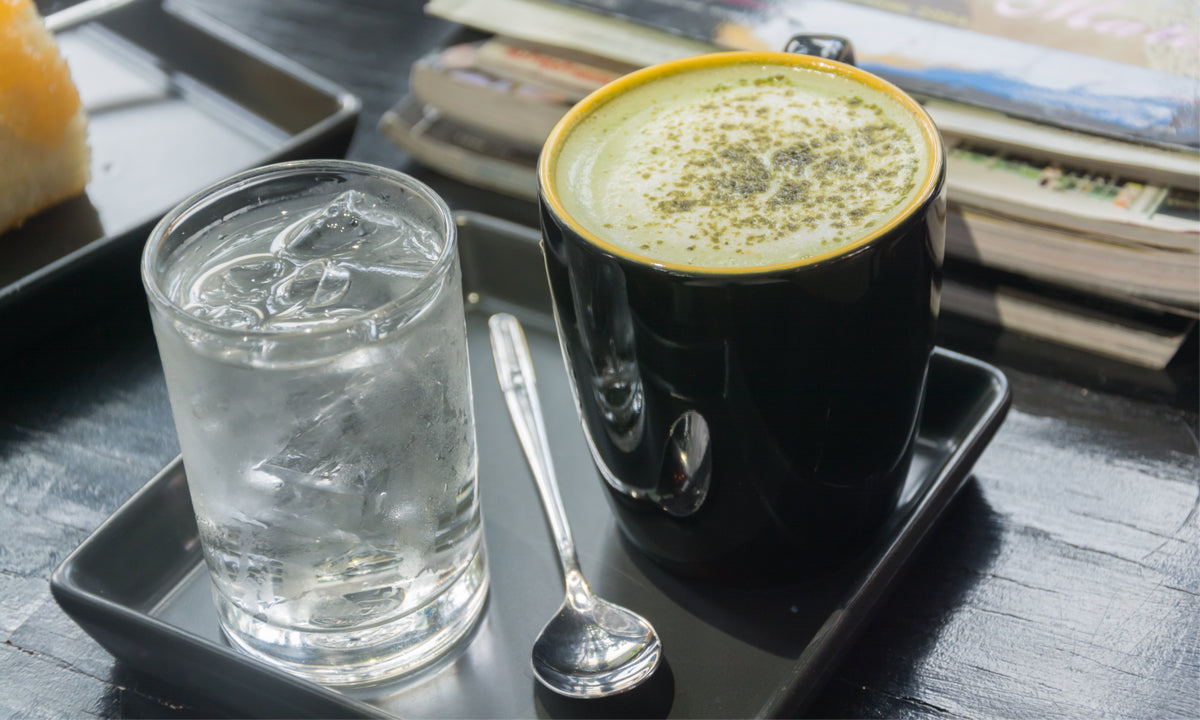Your Cart is Empty
FREE SHIPPING on US orders over $45. Save 25% With Code TAKE25 at checkout.
FREE SHIPPING on US orders over $45. Save 25% With Code TAKE25 at checkout.

The skin care mantra is hydrate, so if you want healthy, glowing skin:
Beverages can be loaded with calories, sugar, and other harmful ingredients just like any solid food. For example, a small flavored latte can easily have 32 grams of sugar in it - the equivalent of 8 teaspoons of sugar!
Sugar even hides in those pre-packaged “healthy” smoothies, with loads of sugar, chemicals, and other undesirable things. In a popular brand's strawberry and banana fruit smoothie - there's 44 grams (equivalent to 10 teaspoons of sugar) of total sugars and though that's not added sugar, your body will still feel the effects of that much natural fructose.
Follow these guidelines:
Soda is one drink everyone should avoid, but that can be difficult, especially with summertime picnics, barbecues, and pool parties.
Even diet soda can be harmful and science is showing that artificial sweeteners can actually contribute to weight gain.
One of the most common (and controversial!) artificial sweeteners is aspartame. Aspartame has been linked to health problems such as headaches and depression, but yet, it’s still approved by the FDA.
Many claim aspartame has been unfairly demonized, such as this article from the National Institutes of Health (NIH), saying there is no scientific proof to back up claims.
We do know this, however: a study was released in July 2017 connecting aspartame to an increased risk of heart disease and increased body mass index. It was not a small study - there were 407,000 participants, each of whom was followed up with over an average of 10 years!
Consuming too much sugar leads to cardiovascular disease, says The Journal of the American Medical Association. It increases the risk of mortality, turns carbohydrates into glucose, which raises insulin levels and puts you at risk for diabetes.
Most people’s diets are comprised of 25% - or more - sugar!
Sugar is just as bad for your skin as it is for your general health. A high intake of sugar increases inflammation and breaking down collagen and elastin. It can also make skin conditions like psoriasis and rosacea worse.
Make this your number one drink of choice.
Our bodies are made up of 70% water, with our brain being made up of 90%, so the health benefits really shouldn’t be a surprise to anyone.
Water has many health benefits including:
Everyone has a different opinion about how much water you should drink per day, but the Mayo Clinic says the National Academies of Sciences, Engineering, and Medicine recommends about 15.5 cups (3.7 liters) of fluids for men and about 11.5 cups (2.7 liters) of fluids a day for women.
Please note these are total fluids, so you will need to adjust your water intake, with your doctor accordingly. This is true if you consume a lot of watery foods or drink other beverages.
Sometimes we just forget to drink beverages, but don’t wait until you are thirsty to sip; also, aging can sometimes make us lose our sense of thirst.
To keep your water intake high, the National Institutes of Health (NIH) recommends drinking throughout the day. Take a full glass of water when you take a pill, and drink a full glass of water before you go out to exercise, to garden, or walk. Keep a glass or bottle of water handy at all times and take sips during meals.
Some exercise instructors will also have you keep water nearby so you can sip every 15 minutes.
Everyone is born with a protective skin barrier that, among other things, keeps moisture in. But every day we experience things that can harm it, such as pollution, harsh chemicals, or the wrong soaps.
When harmed by these factors, skin looks thin and dry, and wrinkles and lines are magnified.
Staying hydrated will help your skin act as that barrier to keep it looking plump, firm, and youthful.
Green tea is one of the healthiest drinks around. It benefits overall wellness, and is a miracle anti-ager for skin.
Green tea is packed with antioxidants, polyphenols, catechins, B vitamins and minerals. It contains a large amount of a catechin called called EGCG (Epigallocatechin Gallate). EGCG decreases inflammation, improves brain health, lowers the risk of heart disease, diabetes, and infection and, because of its thermogenic effect, may help you lose weight.
Most of all, this drink has a powerful chemopreventive (anti-carcinogenesis) potential, says the National Institutes of Health (NIH).
ECGC and other powerful antioxidants in this beverage fight free radical damage, reduce skin inflammation, balance oily skin, and gently exfoliate.
These include:
Juices are double-edged swords because they’re high in vitamins, but also may be packed with sugar. Be sure to read the labels to be sure they are only 100% juice.
Freshly-pressed juices are preferable, as these have the benefit of being full of all of the vitamins and minerals in the fresh fruit. You can also incorporate hydrating vegetables like cucumber into your juices to up the benefits and reduce the sugar content.
Cranberry juice is high in vitamin C, which offers many health and skin benefits. Cranberry juice also has antibacterial properties that may fight off urinary tract infections and protect against periodontal disease.
Orange juice might be high in vitamin C but better than the juice - if you eat an orange, you’ll also get fiber.
This is the subject of an ongoing debate. Some say it’s full of nutrients, such as vitamin D and B-12, plus calcium, and riboflavin (vitamin B2), and can protect your heart and bones. Others disagree.
It comes down to how your body reacts. If you are lactose-intolerant or have a problem with the milk protein, casein, you should obviously skip this beverage.
The best way to drink your way to good health and great skin is to make your own, such as: